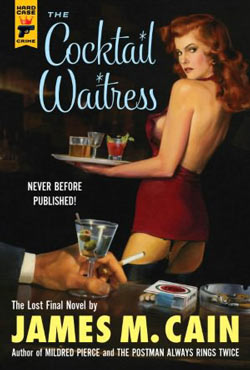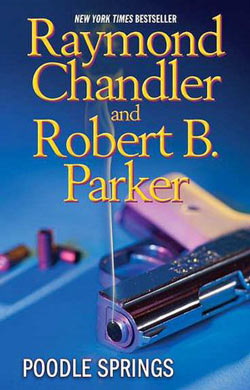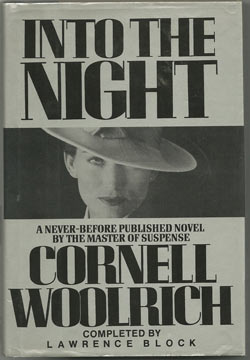
For book lovers the big game is the mythical lost manuscript that may or may not even exist. Now, with the publication of James M. Cain’s The Cocktail Waitress we have a genuine rediscovery to marvel at. No one is claiming the novel to be on the level of Cain’s best-known works, The Postman Always Rings Twice, Mildred Pierce, and Double Indemnity, but Cain wrote plenty of subpar novels in their wake.
The Cocktail Waitress is made remarkable by the fact that, despite rumors, scholars were starting to doubt if it even existed at all. Only through the intrepid hunting of Hard Case Crime honcho Charles Ardai who went on an Indiana-Jones-worthy quest to uncover the lost book, can we enjoy another dose of Cain. And the find stokes the fire to discover the next long-forgotten work.
Ardai, doing the work many of us wish we could, had tremendous difficulty locating the manuscript. In an interview with Duane Swierczynski he stated, “(I) talked to the literary agents who handled the estate—they’d heard of the book but didn’t have a copy, didn’t know where a copy might be found, discouraged my looking because, well, if it had remained unpublished all this time, how good could it be? I thanked them and went on with my search. Rare book dealers? Collectors of manuscripts? Fellow Cain devotees? I won’t say I talked to everyone, but I talked to a good cross-section, and no one had ever read The Cocktail Waitress.”
While surely the biggest buried treasure story of 2012 in the mystery community, it certainly isn’t the first. For the big guns of classic crime and noir fiction there has always been a hunger for just one more story, one more adventure on par with the best of them.

And the fanfare around the 1989 publication of Poodle Springs delighted in the resurrection of a lost classic, never mind the fact that the majority of what people were reading was written three decades after the original pages for Poodle Springs were shoved into a drawer. Putting “lost” on the cover of a book seems to be like the equivalent of putting “low fat” on food packaging. It might not technically be true in all cases, but it makes the consumer feel like they’re getting a little extra.
Continuing down the line on the Mt. Rushmore of noir, Dashiell Hammett’s estate was similarly scoured for any scraps of unfinished manuscripts. The recent publication of two new Thin Man stories Hammett wrote as treatments for the film series proves that people are still clamoring for “new” material. And sometimes “previously unpublished” is as good as “lost.”
Hammett got his “lost” release too with the publication of the slightly misleading title, Lost Stories. In truth, these stories were previously published, though not in over half a century. For stories to be out of print for so long, especially when interest in a writer like Hammett is still going strong, justifies the tag “lost” but the 21 stories collected didn’t involve the same level of literary archeology something like The Cocktail Waitress required. But any collection that makes Hammett’s work accessible to those of us without a complete collection of first edition Black Mask issues from the 1930s is okay by me.
The same justification was used to qualify a story from noir master Cornell Woolrich as “lost” in 2011. The Strand magazine unearthed a story called “Never Kick A Dick” first published in 1938 in Double Detective magazine and unseen since. So was it truly lost? No. But after multiple collections of Woolrich’s short stories had been compiled in the decades since and not one included “Never Kick A Dick,” it might as well have been.

Woolrich was so prolific and wrote under multiple pseudonyms that it is entirely likely we have more “lost” stories to look forward to from those early pulp magazine days. Woolrich even got his turn at having an unfinished novel completed by a modern master when Lawrence Block was tapped to finish Woolrich’s Into The Night. Published twenty years after his death, Woolrich’s novel of guilt had the opposite problem as Poodle Springs, it was missing the first 20-odd pages. And it had no ending other than what Woolrich had written and crossed out.
Block is listed not as co-author, but rather with the more oblique credit as “completed by Lawrence Block” appearing on the jacket. Block seemed to take a “first do no harm” approach to completing Woolrich’s work.
“I felt that my job was really to do as little as possible to make the book available in a finished, readable form,” Block said. “I don’t by any means regard myself as his collaborator.”
Woolrich’s other unfinished novel, The Loser, has been published in the collection of miscellany Tonight, Somewhere In New York with no known plans to have another writer finish it more completely. And the discovery of any truly unknown or unpublished works is unlikely due to Woolrich’s habit of discarding his own papers and writings as if they were worthless, and indeed they may have been to him and his notorious self-loathing.
It continues throughout the publishing industry, from resurrecting early works such as Hunter S. Thompson’s The Rum Diaries and slapping the “lost” tag on it, to publishing unfinished manuscripts by today’s bestsellers like David Foster Wallace’s recent The Pale King.
The endless search for lost material happens throughout all aspects of the arts. Recent finds of previously believed lost footage from Fritz Lang’s Metropolis to the 2005 discovery of a pair of Jackson Pollock canvases found in storage only fuel the desire to locate a missing piece of history.
What the next literary discovery will be no one knows, but for fans of a good mystery the lure of a cache of lost writings is too intriguing to let go of.
Eric Beetner is the author of Dig Two Graves, Split Decision and A Mouth Full Of Blood, as well as co-author (with JB Kohl) of One Too Many Blows To The Head and Borrowed Trouble. His award-winning short stories have appeared in Pulp Ink, D*cked, Grimm Tales, Discount Noir, Off The Record, Murder In The Wind, Needle Magazine, Crimefactory, The Million Writers Award: Best New Online Voices and more. His newest novel, The Devil Doesn’t Want Me is available now. For more info visit ericbeetner.blogspot.com.
Read all posts by Eric Beetner for Criminal Element.

Nice piece, Beetner.
Very nice one.